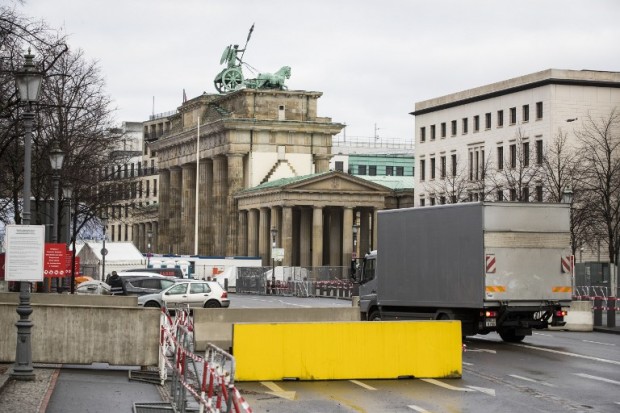
A truck is let through a concrete barrier in front of Berlin landmark Brandenburger Gate on December 29, 2016. Security around the annual New Years celebration in Berlin has been stepped up after an attack on a Christmas market in the German capital earlier in the month. AFP
BERLIN, Germany — German police Thursday freed a Tunisian man initially believed to be an accomplice in the Christmas market attack, as details emerged of how security services underestimated the threat posed by suspected jihadist killer Anis Amri.
Before ploughing a truck into the Christmas market killing 12 people, the 24-year-old Anis Amri had reportedly sent a selfie and a chilling text message reading: “My brother, all is well, according to God’s will. I am now in a car, pray for me my brother, pray for me.”
Investigators had thought the recipient of these messages was a 40-year-old compatriot of Amri’s and arrested him in Berlin on Wednesday.
But a spokeswoman for the federal prosecution service, which handles terrorism cases, admitted on Thursday that the man detained was “not the suspected contact of Anis Amri.”
“He has therefore been released from detention,” Frauke Koehler told reporters, pledging that “the investigation into further accomplices or possible people who knew… will continue at full speed”.
She also said that authorities considered authentic a video message released last Friday, in which Amri is seen swearing allegiance to the head of the Islamic State group, Abu Bakr al-Baghdadi.
‘Preventing worse’
Koehler said the pistol Amri used to fire at an Italian police officer before he himself was shot dead in Milan last Friday had the same .22 calibre as the bullet fired inside the lorry cabin.
Ballistic experts were still checking whether Amri used the same handgun in Milan and in Berlin, where he is thought to have shot dead the registered Polish driver of the truck, Lukasz Urban.
The spokeswoman added that the exact cause or time of death of Urban, who is due to be buried in Poland Friday, still could not be determined, but that he was killed “shortly before” the market attack.
The autopsy report was expected in early January, Koehler said, while denying media reports that his corpse bore stab wounds.
Koehler confirmed that the 40-tonne truck came to a rest after 70-80 metres (230-260 feet) thanks to its automatic braking system that activates when impacts are detected, likely “preventing even worse consequences”.
Eight identities
The Berlin bloodshed, Germany’s worst jihadist attack, has cast a harsh spotlight on security services who had long monitored rejected asylum seeker and radical Islamist Amri.
Counter-terrorism officials had a detailed file on Amri, knew he was tightly linked to Germany’s radical Islamist network and had looked up instructions online on how to build pipe bombs, the Sueddeutsche Zeitung reported.
The latest version of their file on Amri, which included information on his eight different identities, was updated on December 14 — just five days before the Berlin attack.
He had been a regular guest at a religious school in a Dortmund apartment run by a notorious radical known as Boban S. that was believed to be a recruitment ground for jihadists.
Nevertheless, on an eight-point scale assessing an individual’s potential danger, with “one” the highest threat, counter-terrorism experts rated him a “five” — meaning they considered an attack possible but unlikely.
Shortly after the rampage, authorities admitted they had been watching Amri, suspecting he may have been plotting an attack.
But surveillance was dropped in September, as police thought he was primarily active as a small-time drug dealer.
Meanwhile in Italy — where Amri first arrived in Europe as a refugee in 2011, served jail time for arson, and died last week — authorities have also been searching for a possible support network.
But so far, said Prime Minister Paolo Gentiloni, “the investigation has not revealed any particular networks that Amri would have had in Italy.” CBB